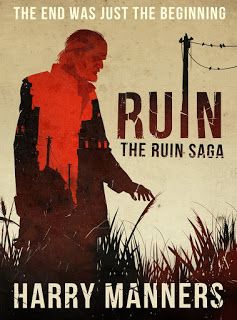Book review: Ruin by Harry Manners
Post-apocalyptic fiction is popular at the moment – so popular, in fact, that it takes a great deal for a post-apocalyptic story to stand out from the crowd. We’ve become well aquainted with zombie apocalypses, nuclear apocalypses, and more recently ecological apocalypses. What Harry Manners offers with his debut novel, Ruin, is something a little different.
Ruin tells the story of Great Britain in the aftermath of a cataclysmic event known simply as the End. For reasons unknown, the vast majority of Britain’s population – and that of the world – completely disappeared, leaving no trace. Every electronic device also stopped working at that moment. The few survivors who remained found the world a very different place.
It’s a story of brutal realities and conflict, but some great characters underpin the narrative. Alex, a visionary leader who aims to salvage what he can of the Old World and bring education and technology to the scattered people of Britain, is deeply conflicted but is regarded as something of a messiah by his followers. Then there’s Norman, trained by Alex to eventually act as his successor, but Norman is plagued by feelings of insecurity and inadequacy. Alex’s mission is a major driving force behind the plot. He has worked tirelessly for decades to keep the light of civilisation burning, but when famine devastates the land even that may not be enough. I did, however, feel that the female characters in Ruin were a little less well developed.
One thing I really enjoyed about this book is the sense of mystery and destiny that the author skilfully weaves into the narrative. There are more questions than answers at the end – an effective cliffhanger leading to the second book, Brink, although the novel works as a standalone.
It’s a very British work of post-apocalyptic fiction. It’s set in the British Isles, the characters are British, and many of its qualities succeed by being understated and subtle rather than overt. Although there’s plenty of violence, Alex’s principles of education and reform seek to change the world so that armed conflict is no longer necessary. There’s a lot to admire in his lifelong mission to transform the lands, hold back the dark, against dwindling odds.
Harry Manners also writes exquisitely, with excellent dialogue and description. Less commonly amongst self-published books, the publication standard is of a very high standard of professionalism: smooth editing, flawless formatting and presentation, and one of the best covers I’ve seen in a long time.
I enjoyed reading this author’s debut novel, and I enjoyed the sequel, Brink, just as much. If you like the post-apocalyptic genre then I think you’ll love this great first book.
Buy Ruin on Amazon.com here, or Amazon.co.uk hereVisit the author’s website@harry_a_manners on Twitter
Alex Roddie Newsletter
Join the newsletter to receive the latest updates in your inbox.




